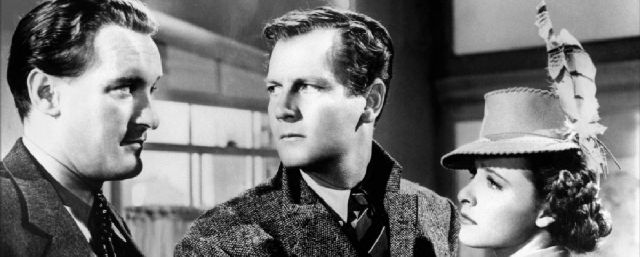Foreign Correspondent (1940) 
“MYSTERY IN WHISPERS that cracks like THUNDER!”

Director: Alfred Hitchcock
Cast: Joel McCrea, Laraine Day, Herbert Marshall
Synopsis: On the eve of WWII, a young American reporter tries to expose enemy agents in London.
For his second Hollywood movie, the redoubtable Alfred Hitchcock chose to extend an invitation to his newly adopted home to participate in the skirmish then taking place in Europe, a belated sequel to the Great War which the combatants had dubbed – with no little unoriginality – World War II. Enemy agents abound in Foreign Correspondent, and the danger of standing by and doing nothing is pressed home from the very first scene. Perhaps it’s this agenda, and the fact that it lacks the customary Hitchcock set-pieces, that contributes to the fact that the movie is somewhat overlooked these days, even though it was nominated for Best Picture in 1940 (losing out to Hitchcock’s own Rebecca). The fact that Hitch had to settle for Joel McCrea and Laraine Day as his leads (instead of his preferred choices of Gary Cooper and Barbara Stanwyck) is also a problem, as neither of them makes much of an impression. Thankfully, the wonderful George Sanders is on hand to step in every now and then to show McCrea how it should be done.
Foreign Correspondent takes place on the eve of WWII, with a stressed American newspaper editor (Harry Davenport – You Can’t Take it With You, Gone with the Wind) despatching a maverick reporter named Jones (McCrea – Kept Husbands, The Most Dangerous Game) to Europe to try and figure out just what’s going on across the pond. The editor hooks Jones up with Stephen Fisher (Herbert Marshall – Trouble in Paradise, The Razor’s Edge), leader of the Universal Peace Party, through whom he hopes to make contact with the eminent diplomat Van Meer (Albert Basserman – The Red Shoes). Despite being preoccupied with a constant battle to keep hold of his newly procured bowler, Jones does manage to hitch a ride in Van Meer’s cab, only for the old man to politely deflect his questions upon realising he is talking to a reporter. Later, Jones witnesses Van Meer’s assassination, and pursues the killers with the help of Fisher’s daughter, Carol (Day) and reporter Scott ffolliott (George Sanders – Rebecca, All About Eve).
Foreign Correspondent clips along at a fair old pace, but never briskly enough to divert the audience’s attention from a number of improbable plot twists and some illogical behaviour on the part of its principals. Some of these credibility-straining incidents are typical of the era, with Jones and Ms. Fisher falling head over heels in love with unseemly haste for example, but other episodes give rise to some serious mental head-scratching. Why, for example, does our hero not suspect his bodyguard (Edmund Gwenn – A Yank at Oxford, The Miracle of 34th Street) of being the culprit when he feels two hands push him into the path of a fast-approaching lorry? Let’s face it – when you’re pushed from behind it’s only natural to immediately suspect whoever was standing directly behind you. However, not only does Jones simply shrug the incident off with a half-hearted glance left and right, he then accepts his escort’s invitation to enjoy a view of London from the highest accessible point in Westminster Abbey! Really – some movie characters truly deserve to die. But then Jones is rather an insipid hero, a fault not of McCrea’s but writers Charles Bennett and Joan Harrison.
The MacGuffin in this one is a secret, both in terms of the coveted object and information withheld from the audience. Van Meer isn’t dead, you see: the assassination was staged with a ringer stepping in for the old diplomat (I bet they skipped over that in the job description…) so that enemy agents could torture the meaning of ‘Clause 27’ out of him at their leisure. Just what Clause 27 is, we never learn, although at some point the screenplay does airily assure us of its critical importance. But, as Hitchcock pointed out, the meaning of the MacGuffin doesn’t really matter – only the fact of its existence and its desirability to a movie’s characters are important.
Foreign Correspondent is never anything less than entertaining, but it also doesn’t quite measure up to Hitchcock at his best. The flavourless performances of McCrea and Day are at least compensated for by a typically wry one from Sanders, and Herbert Marshall also gives a good account of himself in an unusually multi-faceted character for the time, but overall the movie probably deserves its status as one of Hitch’s less important efforts.
(Reviewed 30th January 2015)
httpv://www.youtube.com/watch?v=LMDJnTKotxo

